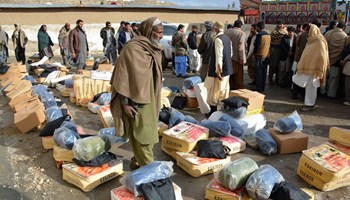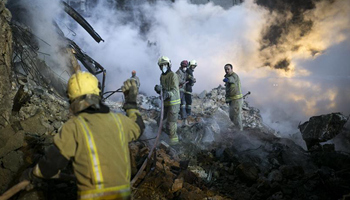BANGKOK, Jan. 26 (Xinhua) -- It is too early for some Thai scholars and media sources to oppose the plan to clear islets and rocky outcrops along the Mekong River to boost shipping navigation as there is no clear evidence that such a plan would cause environmental or other damage, an expert on the matter has told Xinhua in an exclusive interview.
Some media sources and Thai scholars have recently been blaming China for pushing the plan to clear the outcrops on the river and speed up shipping navigation, saying that it would harm the river's aquatic diversity or possibly cause some environmental damage.
Zhu Zhenming, a scholar who works at Thailand's Thammasat University, told Xinhua, however, the blame is unwarranted as clear evidence of the plan harming diversity or the environment has not been firmly presented.
Zhu, a professor of the Yunnan Academy of Social Sciences, who has studied about Thailand and Southeast Asia for more than 30 years, said to oppose the plan, in this case, one needs clear evidence that it may cause great harm to the environment.
Some Thai media and experts should firstly study whether the clearing of islets and rocks on the Mekong River would cause environmental or other problems, explained Zhu.
As for the potential threat to fish populations, as claimed by some scholars as the rocks and islets in question are thought to be breeding grounds, Zhu said similar instances of clearing rocks and islets in Yunnan province had not caused major problems.
"We didn't find any major damage to fish populations after the rocks and islets were cleared in Yunnan province," Zhu said, adding that there are no statistics to prove that fish population would be adversely affected.
Zhu emphasized that the current plan includes a survey and environmental and social assessments, "now, as we are just in the process of studying, we should wait and see the result of the assessments, it is too early to oppose the plan now," the expert said.
He also said the Thai media and so-called experts should not have blamed China for pushing the plan and have been misplaced in their premature accusations.
The plan to improve navigation along the Mekong, which involves clearing islets on the river is not a unilateral decision made by China, but has been agreed to by four countries, namely China, Laos, Myanmar and Thailand, Zhu said.
Last December, the Thai government approved the plan, known as the Development Plan for International Navigation on the Lancang-Mekong River (2015-2025), with an initial survey, design, and environmental and social assessments.
"China, Laos, Myanmar, and Thailand previously jointly set up a study team and agreed to clear the islets, which are obstacles to navigation on the river and agreed to set up a team of experts to survey and design ways to make the river passable for 500-ton cargo vessels," said Kobsak Pootrakool, a vice-minister in Thailand's prime minister's office.
The remarks were made when he announced that the Thai government had approved the navigational improvement plan, Thai media TNN reported.
The plan is set in two phases with the first (2015-2020) specifying a 630-km navigational improvement route from the China-Myanmar boundary marker 243, to Luang Prabang in Laos. The second phase (2020-2025), meanwhile, includes a 259-km navigational improvement route from Simao Port in Yunnan province, to the China-Myanmar boundary marker 243.
Both phases also include the construction of cargo and passenger ports.
While losses of implementing the plan are not yet clear, the gains, including those to Thailand, Laos and everyone involved are obvious, according to Zhu.
The Mekong waterway from Jinghong, Yunnan province, to Huay Xai, Laos and Chiang Khong, Thailand, linking China, Myanmar, Laos and Thailand, was opened to commercial navigation in 2001, but there are many rocks along the section between Huai Xai and Luang Prabang which are obstacles to navigation, Zhu explained.
"There are many rocks on the river and these rocks, which are above the surface of the water during the dry season but are submerged by water in the wet season, become obstacles to navigation and a threat to water transport safety," Zhu said.
He said safety is very important for everyone and that such kind of navigational improvements are sure to benefit all countries linked by the waterway, especially Thailand and China, as most ships using the waterway are from these two countries.
Some Thai experts said Thailand will lose more than it gains after implementing the plan as China-Thailand trade statistics of the Chiang Saen and Chiang Kong district checkpoints, show that Thailand exports more from China and imports less.
Zhu said, however, it is a big mistake to draw such a conclusion from the data of only two checkpoints in such a short period.
"You cannot use data of certain checkpoints to draw a whole picture of one country's trade map. Furthermore, trade is dynamic, Thailand has a trade deficit with China in recent years but in the past Thailand used to have a trade surplus with China for many years. It is always changing, we cannot draw such a conclusion based on these statistics, Zhu said.
China has been one of Thailand's top two export destinations in recent years so the navigational improvements are sure to facilitate and boost Thailand's exports to China, he added.
The plan may also boost tourism in the region.
For example, the waterway will make travel to the ancient Laotian capital Luang Prabang, a World Heritage Site, more convenient, Zhu explained.
"Passenger ports are to be built according to the plan and they are sure to attract tourists as they will be able to enjoy the landscape of two sides of the river during the trip, and countries along the river may benefit from the growth of tourism," said Zhu.
He also mentioned that further studies are needed in the future to decide whether the plan will impact local communities and local residents, as their lifestyles may be altered.
Locals may think they prefer their peaceful lives now, but they will certainly benefit from convenient transportation, Zhu said.
He suggested some Thai experts should not have a negative mindset about the project before fully and objectively studying its gains and losses and the media should not politicize such a development plan.











